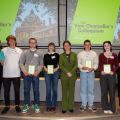
‘Tories should be most worried about UKIP in 2015’
UKIP will inflict much more damage on the Conservative Party in the 2015 General Election than on Labour, according to research by Professor Geoff Evans and Dr Jon Mellon from Nuffield College at the University of Oxford.
UKIP will inflict much more damage on the Conservative Party in the 2015 General Election than on Labour, according to research by Professor Geoff Evans and Dr Jon Mellon from Nuffield College at the University of Oxford.
They analysed data from surveys for the British Election Study (BES) tracking the flow of the vote towards UKIP from 2005–2014 using respondents who were in the 2005 and 2010 BES panel surveys, as well as 30,000 new respondents in a third wave who were surveyed in autumn 2014.
Professor Evans, who is co-director of the BES, says the data reveals that many of Labour's core supporters had already deserted their party between 2001 and 2010 as a reaction to Tony Blair and New Labour and have since moved to UKIP. Some 80% of 2005 Conservatives who in 2014 said they intended to vote for UKIP were still Conservative in 2010. However, a mere 40% of 2005 Labour voters were still Labour by 2014. The data suggests Labour's loss to UKIP is partly hidden because supporters have already shifted political allegiances and followed other routes prior to arriving at UKIP.
The BES data shows that most UKIP voters who voted Labour in 2005 did not vote for them again in the General Election of 2010. UKIP support in Labour constituencies was found to be more likely to be taken from former Labour voters who had been disaffected for several years already. This disaffected group is more likely to be manual workers than the middle classes, who were attracted to New Labour. So the damage to Labour’s core support had already been done by new Labour’s focus on a pro-middle class, pro-EU, and as it turned out pro-immigration agenda.
Professor Evans said: 'Most of the 2005 Labour voters who supported UKIP in 2014 had already turned their back on Labour by 2010. New Labour's move to the liberal consensus on the EU and immigration in 2001, 2005 and 2010, left many of their core voters out in the cold a long time before UKIP were around. UKIP’s newer voters will overwhelmingly be those who voted Conservative in 2010. Even the Liberals lose more to UKIP than do Labour. While UKIP appears to have inflicted damage already to Labour, the switch from the Conservatives to UKIP is still happening.
'To some degree therefore what UKIP are doing is picking up long disaffected former Labour voters from the Conservatives and elsewhere. UKIP will not be a great threat to too many Labour seats in 2015. They will probably steal more votes from the opposition parties in those seats, or people who did not vote in 2010.'
The findings suggest that the switch to Conservative from Labour is unrelated to either party’s handling of immigration. However, switching from Conservative to UKIP is strongly linked to the perceptions of survey respondents in 2010 about how both the Conservative and Labour parties handled immigration.
Funded by the Economic and Social Research Council, the BES is managed by a team of researchers from the Universities of Oxford, Manchester, and Nottingham.
 Researchers find oldest undisputed evidence of Earth’s magnetic field
Researchers find oldest undisputed evidence of Earth’s magnetic field
 Honorary degree recipients for 2024 announced
Honorary degree recipients for 2024 announced
 Vice-Chancellor's innovative cross-curricular programme celebrated
Vice-Chancellor's innovative cross-curricular programme celebrated
 New database sheds light on violence in Greek detention facilities
New database sheds light on violence in Greek detention facilities
 New trial using skin patches as an ‘early warning system’ to spot lung transplant rejection
New trial using skin patches as an ‘early warning system’ to spot lung transplant rejection